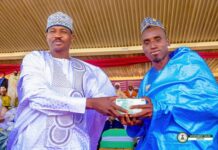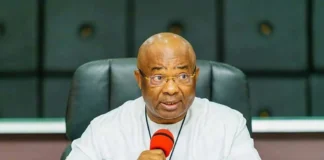Kwara based prominent sociologist and community development practitioner, Alhaji Lawal Olohungbebe on Monday cautioned the State Governor-elect, Alhaji AbdulRahman AbdulRasak on his victory in the March 9 gubernatorial election adding that his success at the poll will be meaningless if he failed to perform.
Olohugbebe stated this while delivering a speech at the “O TO GE” Dinner and Award Night organised by the AbdulRahman AbdulRasak Movement for Positive Change.
The event was held at the prestigious Atlantic Events Centre in Ilorin, the Kwara State capital.
AbdulRasak, under the platform of the All Progressives Congress (APC) in the state governorship election, defeated Abdulrazaq Atunwa of the Peoples Democratic Party (PDP) in a landslide victory widely believed to have ended Senate President Bukola Saraki’s domination of Kwara State politics.
Olohungbebe, however, in his speech said winning an election is a mock examination while entrenching an improved system is the real examination which the governor-elect is yet to sit for.
“Let us bear in mind that if this victory is mismanaged, it will amount to extended bondage. There are no excuses for nonperformance!
“Therefore, the incoming government must tread with caution in the delicate balancing act of managing the youths, notwithstanding the level of their perceived contributions to the victory of APC in the State,” he said.
Read the full text of the speech below
INTRODUCTION
It is possible many of us are familiar with the story of Mohammed Bouazizi. He was a young Tunisian street vendor whose government’s insensitivity and lack of focus forced him to take death as a more fulfilling alternative. He set himself ablaze and sparked off a revolution with his self-immolation act; the result of which was a wide spread uprising that spread through the middle East in late 2010.
Dubbed the Arab Spring, the whole world watched as an increasingly sophisticated young generation rose up against oppressive regimes and governments to secure a brighter future and more realistic economic prosperity. The revolution was instigated by dissatisfaction of youths and fueled by their new found cohesion built on the strength of new media.
What’s the import of this story? It’s to emphasize that just like young people served as the drivers of the Arab Spring; the “O TO GE” movement, notwithstanding the claim of sacrifice and contributions that everyone would now want to claim, was built to a large extent, on the energy and mobilization capacities of young people of Kwara State.
And just as they became the foot soldiers that mobilized for the success of the incoming government at the polls; I must emphasize that it would take just one young, energetic and versatile young person to be disappointed in the new government for the seed of its failure to be sowed.
Therefore, the incoming government must tread with caution in the delicate balancing act of managing the youths, notwithstanding the level of their perceived contributions to the victory of APC in the State.
I must repeat that in most cases, revolts are ignited by the courageous, resonated by the outspoken, and then marshalled by those who are quiet, smart and meticulous. Today, we are celebrating the bold originators, the brilliant orators, the silent achievers, the smart strategists and the meticulous implementors among us. Above all, we are celebrating those who have become winners because, aside their Creator’s glory, they took a risk and they were patient.
I won’t shy away from stating the fact that today’s awards, as meritorious as they appear, won’t be meaningful if after the first four years of this incoming government the system hasn’t changed for good. In fact, these awards would have been delayed till then. Winning an election is a mock examination while entrenching an improved system is the real examination and you haven’t sat for it yet. Be that as it may, the awardees deserve to be celebrated for passing the mock because their counterparts failed the same examination. I sincerely congratulate you all.
For the organizers of this unprecedented event, the AbdulRahman AbdulRasak Movement for Positive Change, I salute your pro-activeness. I recognize and appreciate your thoughtfulness. You are all achievers. However, the task of being change agents is far beyond this wonderful event.
You need to be on ground as facilitators of sustainable development, participatory government and asset-based community development. Do not be doomed into oblivion after tonight. The world is watching.
As exhaustive as it was, in the timeline of this historic revolution, winning the elections in an unprecedentedly convincing way was a nerve-racking phase while implementing and entrenching an improved system can be a more challenging phase. Yes, your case is that of the bride on whom the sun shines, but to remain the preferred wife is the daunting tasks ahead. Let us bear in mind that if this victory is mismanaged, it will amount to an extended bondage. There are no excuses for nonperformance!
Having gone through dossier of different revolutions across the globe, I have chosen, among them, the ones similar to the 2019 “O TO GE” revolution. The similarity may be obscure looking at the players therein but when lessons learnt are considered, it becomes crystal clear. I believe that as we celebrate, lessons from previous celebrations mustn’t be jettisoned. Lessons from the rise and falls of other revolutionaries are worth being shared and I am here to share the lessons.
SOME SELECTED REVOLTS AND THEIR INHERENT LESSONS
1 The Peasants’ Revolt
The Peasants’ Revolt was a huge revolution in England in the late 14th century, June 1381. The lower classes of the then England were revolting against their feudal overlords for reasons around the Black Death, higher taxes on ordinary peasants and spending more time on the Church’s land at their own detriment. When the revolt began, the peasants took control of numerous major cities, including London and its Tower.
The King, Richard II, was forced to flee for his dear life. He met with rebel leaders at Mile End and later at Smithfield where he ordered those leaders immediately be killed. Killing the leaders gave the royals enough time to gather soldiers and retake London. They then got to work executing anyone involved.
Some Lessons Learnt
Do not upset the lower classes with anti-people policies.
Be careful of whom you meet and what you share with them.
Protect the environment.
2 Polish revolutionaries in Greater Poland
The Prussia, a land used to be known as part of southern Lithuania, the Kaliningrad exclave of Russia and north-eastern Poland, was, at a time, under a central government. The revolutionaries sought autonomy from Prussian rule in 1848 and were doing well until they showed hostility towards Germans and Jews who were also part of the struggle. Subsequently, they lost the support of German revolutionaries. As a result, one more liberation movement was crushed.
Some Lessons Learnt
Do not (attempt to) cheapen the contribution or sacrifice of any person or group with whom you struggled, as everybody matters.
There will be issues; remain united, come what may.
3 The Burkinabe Uprising
President Blaise Compaoré ruled Burkina Faso, “the land of the upright people” for almost three decades. The historic popular and largely peaceful protests in October 2014 forced him to abdicate power. But while the Burkinabè severed the snake’s head, its body survived. Few hours after Compaoré resigned, Lt. Col. Yacouba Isaac Zida, second-in-command of the presidential guard, assumed office as interim president.
Under pressure from the African Union, Zida also abdicated and power transferred to a civilian and fellow insider from the former regime, Michel Kafando.
President Michel Kafando had served in two previous governments as a foreign minister and ambassador. He later supported the 1987 coup against Thomas Sankara and served the Compaore’s government as ambassador to the UN from 1998 to 2011. Kafando in turn named Zida prime minister and minister for defense. Although Paul Kaba Thieba has taken his place as the Prime Minister, nothing significant has changed in Burkina Faso because the leadership and the approaches have not changed. The old folks are still in power.
Some Lessons Learnt
Avoid bending the arc of politics back toward the status quo ante.
If the body of the severed snake must survive, determine its survival
4 The Egypt’s Upheaval
President Hosni Mubarak held power for nearly thirty years in Egypt. In February 2011, the Tahrir Square movement forced him to resign in a popular uprising as part of the broader Arab Spring movement. He was toppled by a revolution that lacked leadership or organizational structure. At that time, Abdel Fattah El-Sisi, the current President of Egypt was the Army’s director of military intelligence.
Having toppled Mubarak, a council of military officers ruled Egypt and El-Sisi was a member of the council. They were supposed to oversee the transition to a civilian government. He reportedly assumed a leading role in secret talks with the Muslim Brotherhood, an organization that had been banned in Egypt until the revolution. Brotherhood leaders trusted El-Sisi in part because he was a devout Muslim.
In June 2012, when Egypt’s first democratic Presidential election was won by Mohamed Morsi, a leader of the Brotherhood, the Army didn’t interfere. Not long after taking office, Morsi forced the retirement of the Minister of Defense and replaced him with El-Sisi. At the age of fifty-seven, El-Sisi replaced a seventy-six-year-old general.
Morsi issued a Presidential decree that granted him temporary power beyond the reach of any court, as a way of preempting the opposition to a new Islamist-friendly constitution. This proved to be the turning point for the Brotherhood’s political fortunes. The group lost the support of most revolutionaries, and the opposition grew steadily, until many state institutions, including the police, refused to work on behalf of Morsi’s government.
As the crisis worsened, in June 2013, an estimated fourteen million people took to the streets in protest against the Morsi’s government. To the Brotherhood leaders, El-Sisi was uncompromisingly on their side. On July 3rd, 2013, soldiers took Morsi into custody, and El-Sisi appeared on television to announce that an interim government would rule until Egypt could hold elections and approve a new constitution. Morsi was pretty much totally taken by surprise when he saw El-Sisi turned against him.
While Morsi languished in the prison, elections took place in 2014. Abdel Fattah El-Sisi ran for President and won ninety-six per cent of the vote.
Lessons Learnt
Stick to the terms of agreements but do not be dogmatic.
Entrench a real participatory government.
Be on the look for the Fifth Columnists.
Be wary of malicious members of the old guards offering a seemingly helping hand.
Environment taints and makes its inhabitants. The previous governments might not be that all bad, but the environment successfully tainted them. Be careful! When they tell you “e ma wole, e ma rora”, you may not see the nails and broken bottles but be wary. The political terrain in Kwara is now slippery and it can’t be reversed anymore.
Native sense informs us about the fact that politics is about sharing. Your government shouldn’t be deliberately oblivious of the principles of fairness; the need for inclusiveness; and the cliché of ‘united we stand, divided we fall’. Kwara should be a front in comity of states in Nigeria for any community not to adopt the attitude the winner takes all.
Over the years, it has been difficult, if not impossible, to put round pegs in round holes. We have experienced this from the local to the federal politics. I frankly advise this government not to compensate politicians with opportunities meant for technocrats. Note that acquisition of followership is not as difficult as its maintenance.
In 1789, Robespierre wanted the death penalty abolished. He succeeded in becoming the ruler of France and murdered many more people than the Ancient Regime he fought against. Today, you are being venerated for successfully unseating the old government. Ensure you are not relegated soon enough to see people longing for the return of the dethroned reign. Do not be found wanting of what you campaigned against. Every word is being archived. If computers get stolen or damaged, the internet keeps records safer.
The expectations are high, and they should be. You told us you would run an all-inclusive government. You told us you would listen to our plights and consider our aspirations. Your party said you are sons of the soil and that you will be approachable. You may not be largely axed if a larger percentage of your promises are kept. Kwarans are reasonable people. Be reasonable too. Run a participatory government as promised.
Thank you for your rapturous attention!















